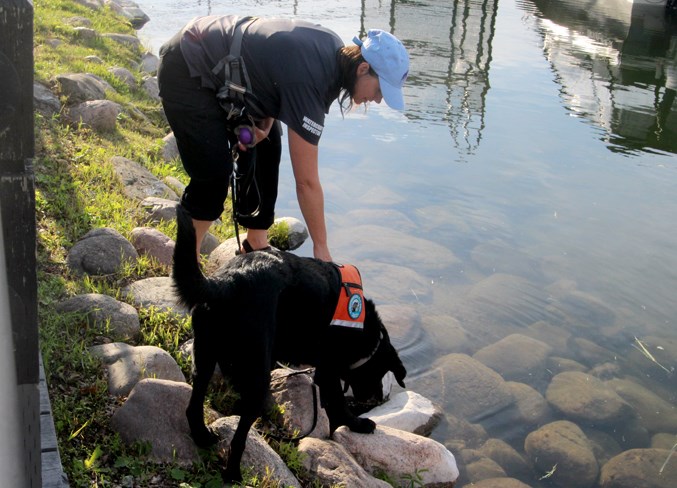The K-9 patrol unit for Alberta Environment and Parks were on the hunt for invasive species.
They’re job is to search shorelines and boats to prevent invasive species, such as zebra mussels, from damaging Alberta lakes.
The three-dog unit, Hilo, Seuss, and Diesel, have been on the job since 2015. On Wednesday, July 11, they participated in a training exercise at the Cold Lake Marina and Kinosoo Beach.
Vials containing quagga and zebra mussels were placed along the shoreline to remind the dogs what they’re looking for, and to keep the exercise fun.
Aquatic invasive species operation lead and dog handler, Cindy Sawchuk, didn’t expect to find any mussels in Cold Lake, but the handlers didn’t want the dogs to give up just because they didn’t find anything.
“We didn’t want to bum them out by having them search and never get their paycheck,” she explained.
When the dogs find mussels, they display a passive alert, such as sitting. Then, the handlers ask them to pinpoint where they found the scent. The dogs will use their nose to show where the smell came from, and the handler confirms the find by giving them their toy.
Sawchuk explained “They don’t get to play with this at home, and that’s why they’re happy to go to work everyday... They’re super driven and focused on their toy that they’ll do anything for it.”
The main focus of the team is to protect and conserve water bodies. The program was started three years ago as a way of preventing invasive mussel introduction.
Local zebra mussel prevention program manager Craig Copeland said a mussel infestation could migrate to the water treatment plants, ultimately damaging the facility.
“The mussels would get into the pipes and restrict the flow from going into the building,” he explained.
Zebra mussels attach themselves to hard surfaces in dark areas. Their reproduction cycle makes them almost impossible to eradicate. Since the mussels aren’t native to Alberta, they have no predators to keep their populations in check.
The dogs’ role in the detection program means they aren’t treated like regular dogs, because they’re focused on their job.
Seuss, a German shepherd, is a rescue from California. The shelter thought he was a dog that needed a job.
Diesel is a Labrador who also came from a rescue shelter in California. His family wasn’t sure what to do with him, so he was assessed and determined to be a good fit for the program. A volunteer pilot flew Diesel to Montana, and someone drove him across the border to join the program in Alberta.
Starting out in guide dog school in California, Hilo, a black lab, decided he wanted a different job. Hilo made a career change and came to work with the Alberta Environment and Parks K-9 unit.
Sawchuk laughed, “I like to say that they came here because we offer a better health care plan and a good retirement package.”
There’s no set amount of years for dogs in the unit, and they get to decide when to hang-up their collars.
All boats are eligible to be checked by the unit. Sawchuk said the group only wants to ensure that Alberta remains mussel free.



